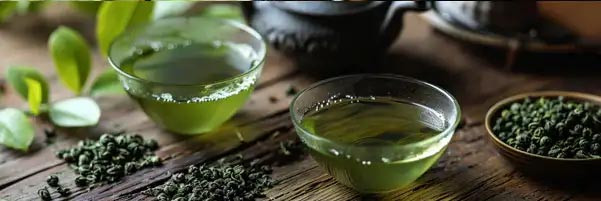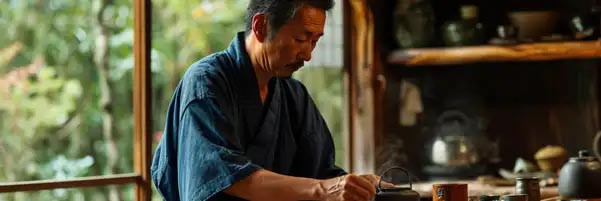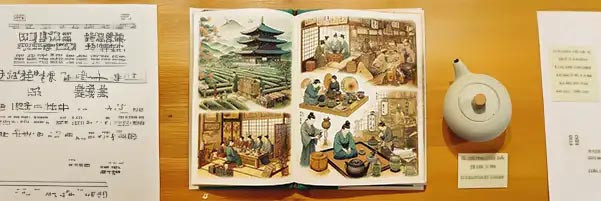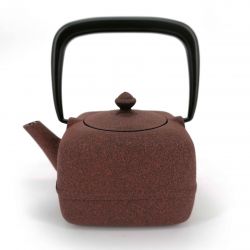The Japanese tea ceremony is an ancient art that relies on great attention to detail and the quality of the products used. Whether you're a novice or an expert, choosing the best products for your tea ceremony can make all the difference. In this article we will give you tips for choosing the best bowls, teapots and accessories for your tea ceremony, as well as information on the advantages and disadvantages of different materials, as well as the most renowned brands and producers.
Selection criteria for bowls, teapots and accessories
When choosing products for your tea ceremony, it is important to consider quality, functionality, durability and aesthetics. Here are some selection criteria to take into account for each type of product:
Bowls: Bowls should be deep enough to hold the desired amount of tea, but not too large to be held comfortably in the hand. The shape and texture of the bowl can also influence the tea drinking experience.
Teapots: Teapots should be designed to maintain water temperature, have an efficient pouring spout, and be easy to handle. The size of the teapot will depend on the amount of tea you wish to serve.
Accessories: Accessories such as teaspoons, matcha whisks and bowl holders should be functional and practical for their intended use.
The advantages and disadvantages of different materials
Bowls, teapots and accessories can be made from a variety of materials, each with their own advantages and disadvantages. Here is an overview of the most commonly used materials:
Ceramic: Ceramic is a traditional material for tea ceremony bowls and teapots. It is durable and retains heat well, making it ideal for hot drinks. However, ceramic can be fragile and break easily.
Porcelain: Porcelain is a lightweight and elegant material that is often used for tea bowls. It is easy to clean and resists stains, but can be expensive.
Cast Iron: Cast iron teapots are durable and retain heat well. They are often decorative and can add a touch of sophistication to your tea ceremony. However, cast iron is heavy and can be difficult to handle.
Bamboo: Bamboo accessories such as matcha whisks and bowl holders are lightweight and durable. They are also easy to clean and do not require much maintenance. However, they can warp or crack over time.
The most famous brands and producers
There are many renowned producers and brands of Japanese tea ceremony products. Here are some of the most popular:
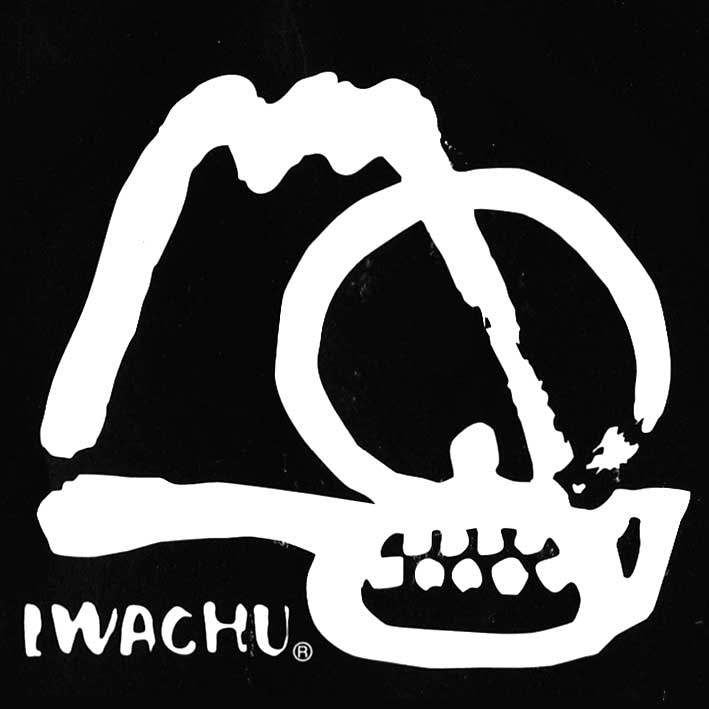
IWACHU
Iwachu is a Japanese manufacturer of high quality cast iron teapots. Founded in 1902, the company specializes in the production of cast iron products, including kitchenware, temple bells and household items. Iwachu cast iron teapots are handcrafted by skilled artisans who use traditional techniques to create unique and durable pieces. Teapots are available in a variety of styles and sizes to meet the needs of each customer. In addition to their traditional, elegant aesthetic, Iwachu cast iron teapots also offer functional benefits. Cast iron is an excellent conductor of heat, allowing teas to stay hot longer. Additionally, cast iron is durable and corrosion resistant, making it an ideal choice for teapots. Today, Iwachu is a company recognized worldwide for the quality of its cast iron products, and its teapots are highly valued by tea lovers and collectors of Japanese crafts.

Cast iron teapot heater, IWACHU, black

Cast iron teapot heater, IWACHU, black
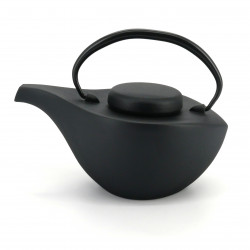
Japanese black cast iron teapot Iwachu, HIKIFUNE 0.7lt
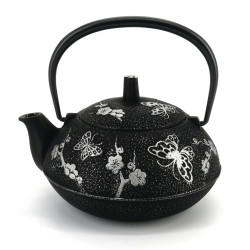
Japanese black silver cast iron teapot IWACHU, CHOCHO, 0.55lt
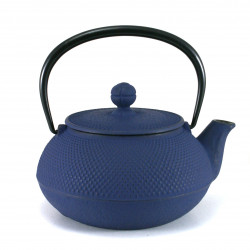
Japanese blue cast iron teapot IWACHU, araré, 0,55lt

Japanese blue cast iron teapot. Iwachu Arare 0.3 lt
.jpg)
Oiharu Foundry Co., Ltd.
Oiharu Foundry Co., Ltd is a Japanese manufacturer of high-quality cast iron teapots, founded in 1952. Located in Iwate Prefecture, Japan, the company is renowned for its craftsmanship and traditional designs. Cast iron teapots are made from premium materials and an ancient casting technique that results in durable, heat-resistant products. Cast iron also allows for heat retention, which is ideal for brewing Japanese tea. The traditional style of the cast iron teapot is inspired by Japanese culture and is characterized by elegant patterns and careful finishes. Teapots are often decorated with floral designs, nature symbols or traditional Japanese scenes, such as cherry blossoms or mountain landscapes. Oiharu cast iron teapots are a popular choice for Japanese tea lovers, as well as those who appreciate premium, artisanal products. Their beauty and functionality make them decorative pieces as well as practical kitchen utensils for preparing and serving tea.
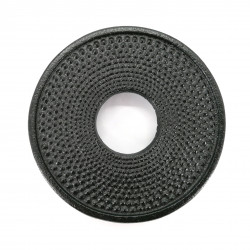
Black cast iron trivet from Japan, ARARE-S
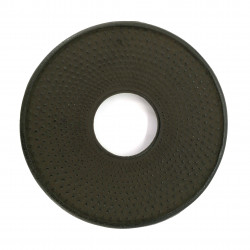
Brown cast iron trivet from Japan, ARARE-L
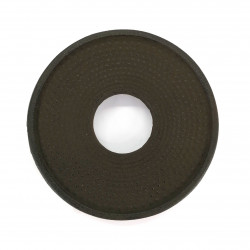
Brown cast iron trivet from Japan, ARARE, Sabi
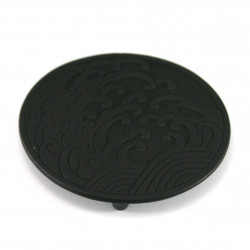
Cast iron teapot, NAMI, wave
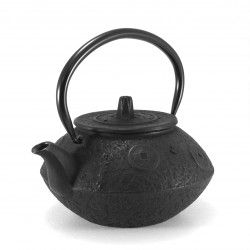
Japan cast iron teapot, OIHARU KOSEN 0,8lt, black
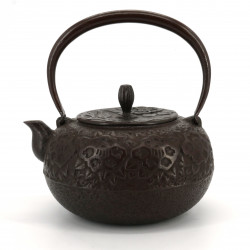
Japanese brown cast iron kettle with Flower pattern, FURAWAZU, 1.6 L
.png)
TOMIOKA
Tomioka is a Japanese manufacturer of cherry bark boxes. The company was founded in 1970 and is located in Akita Prefecture, Japan. Tomioka uses traditional techniques to extract cherry bark, process it and shape it into boxes of different sizes and shapes. Boxes are often used to store valuable items such as jewelry, tea accessories or musical instruments. Tomioka's products are known for their exceptional quality and natural beauty, showcasing the unique patterns and textures of cherry bark. The making of these boxes requires a lot of manual labor and know-how, making them valuable and unique objects.
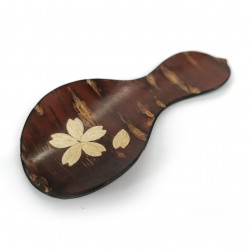
Cherry bark spoon, HYOTAN SAKURA, squash
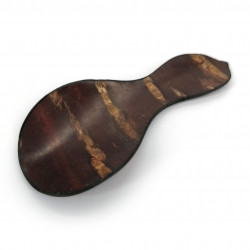
Cherry bark spoon, HYOTAN, squash
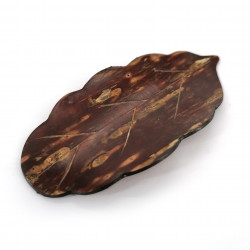
Cherry bark spoon, KOHANA, leaf
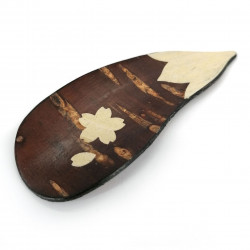
Cherry bark spoon, NASUBI, eggplant

Cherry bark tea box with cherry petals, SOKAWA, 110 gr
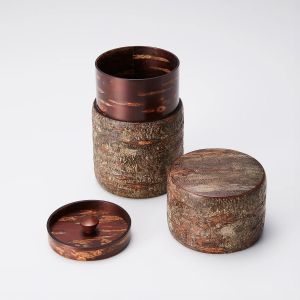
Cherry bark tea box, DOUMORI CHIRASHI

HAKONE
Hakone Maruyama is a Japanese manufacturer of Japanese Yosegi marquetry objects from Hakone. Yosegi marquetry is a Japanese artisanal technique that involves assembling thin, colored strips of wood to create complex geometric patterns. This technique originated in the Hakone region of Kanagawa Prefecture in Japan. Hakone Maruyama is known for his exceptional craftsmanship in creating jewelry boxes, caskets, trays and other decorative items using this Yosegi marquetry technique. The company's artisans carefully select the woods to use for each project, then cut, join and polish the pieces to create precise, vibrant designs. Hakone Maruyama's Yosegi marquetry objects are valued for their beauty, quality and durability. They are considered unique pieces of art and are often purchased as souvenirs or gifts for their elegant designs and exceptional quality.
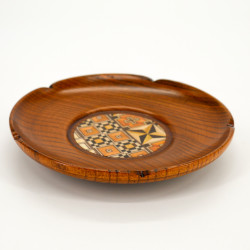
Coaster in round wood with traditional marquetry detail from Hakone
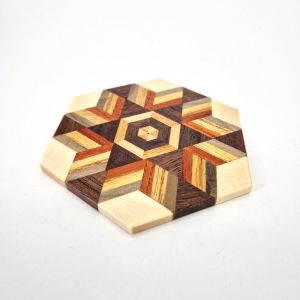
Hexagonal YOSEGI cup coaster, traditional Hakone marquetry
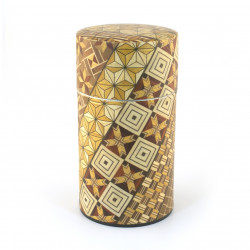
Japanese tea box traditional Japanese parquetry YOSEGI
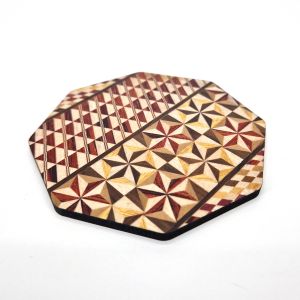
Posavasos octogonal YOSEGI, marquetería tradicional de Hakone
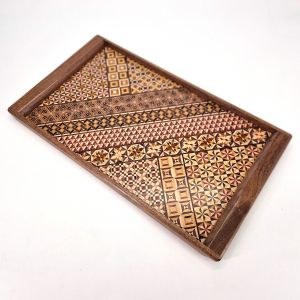
Rectangular non-slip YOSEGI tray, traditional Hakone marquetry
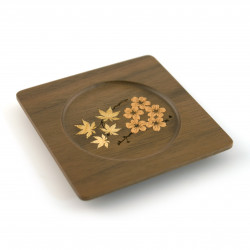
Traditional Hakone marquetry inlaid wood coaster

Itchu-do Co., Ltd
Itchu-do is a Japanese manufacturer renowned for its high-quality cast iron teapots. Founded in 2000, the company is based in Morioka City, Iwate Prefecture, Japan. Itchu-do uses traditional methods of making cast iron teapots, combining artisanal techniques with modern technologies to produce high quality products. Itchu-do's cast iron teapots are valued for their durability, ability to maintain heat, and elegant aesthetics. Each piece is handcrafted, making it a one-of-a-kind work of art. Teapots come in a variety of sizes and styles, from classic designs to more modern designs. Itchu-do strives to respect the environment and uses recyclable and sustainable materials in the production of its products. The company is also committed to maintaining high standards of social responsibility towards its employees and the local community. Les théières en fonte d'Itchu-do sont appréciées pour leur durabilité, leur capacité à maintenir la chaleur et leur esthétique élégante. Chaque pièce est fabriquée à la main, ce qui en fait une œuvre d'art unique en son genre. Les théières sont disponibles dans une variété de tailles et de styles, allant des designs classiques aux modèles plus modernes. Itchu-do s'efforce de respecter l'environnement et utilise des matériaux recyclables et durables dans la production de ses produits. La société s'engage également à maintenir des normes élevées en matière de responsabilité sociale envers ses employés et la communauté locale.
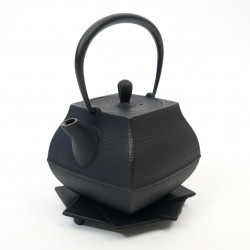
Japanese black cast iron teapot from Japan, ITCHU-DO SEKITEI + trivet
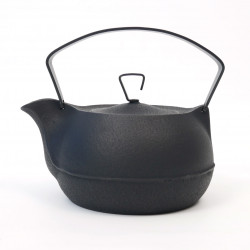
Japanese Cast Iron Kettle, IT-CHUDO, 1.2 L, Black
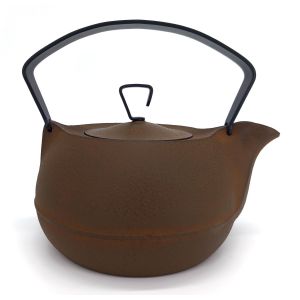
Japanese cast iron kettle, IT-CHUDO, 1.2 L, brown
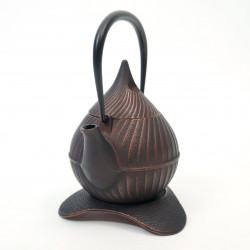
Japanese Cast Iron Teapot, copper color, ITCHU-DO, TSUBOMI, + trivet
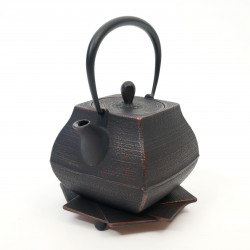
Japanese copper-colored cast iron teapot from Japan, ITCHU-DO SEKITEI + trivet
.JPG)
CHUSHIN KOBO
Chushin Kobo is a Japanese manufacturer of high quality cast iron teapots. Founded in 1997 by Hisanori Masuda, the company has gained an international reputation for its traditional Japanese-style cast iron products that are valued for their beauty, durability and ability to maintain heat. Chushin Kobo is known for its traditional manufacturing techniques, which involve casting cast iron into sand molds, followed by a hand polishing and finishing process. Cast iron teapots from Chushin Kobo come in a variety of styles, patterns and colors, from classic designs to bold modern designs. Cast iron teapots from Chushin Kobo are also very practical, as they maintain the heat of the tea for a long time and are robust and shock resistant. They are also easy to maintain and clean, and can be used for a variety of tea types, including green tea, black tea, oolong tea and herbal tea.
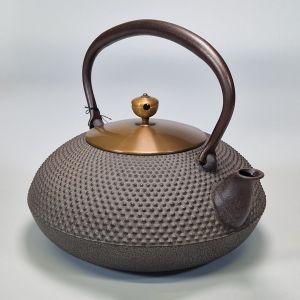
Japanese cast iron kettle SABI copper lid, 1.6 lt, ARARE
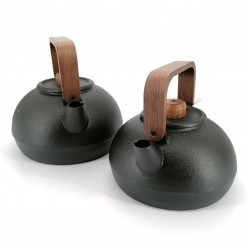
Japanese cast iron kettle with brown wooden handle, MOKUSEI HANDORU, black
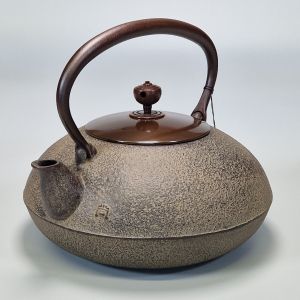
Japanese cast iron kettle with copper cover, HIRAMARU, bronze
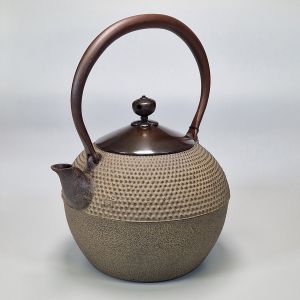
Japanese cast iron kettle with copper cover, HOUJOU HARARE
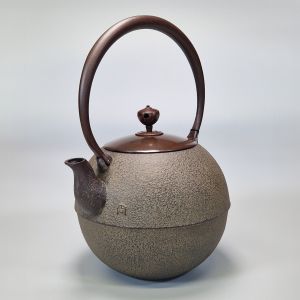
Japanese cast iron kettle with copper lid, MARU, bronze
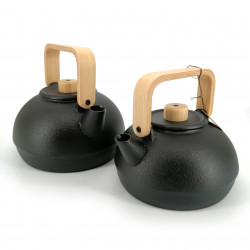
Japanese cast iron kettle with light wood handle, MOKUSEI HANDORU, black

KOTODO
Kotodo is a Japanese manufacturer of tea boxes covered with washi paper, which is a traditional Japanese paper made from mulberry fibers. Kotodo tea boxes are handcrafted by skilled artisans who have perfected their craft over the years. Each box is unique and represents meticulous work of precision and beauty. Kotodo tea boxes are often decorated with traditional Japanese designs and are used to store loose tea or tea bags. These boxes are both functional and aesthetic, making them popular with collectors and tea enthusiasts. The Kotodo brand is renowned for the quality of its products and its respect for Japanese tradition.
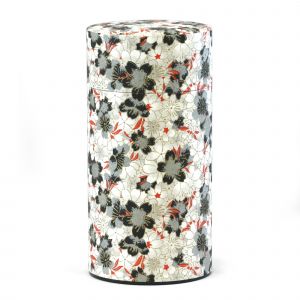
Beige and black Japanese tea box in washi paper - KAHEI - 200gr
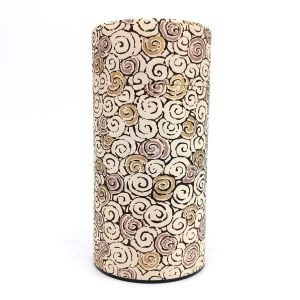
Beige Japanese tea box in washi paper - RASEN - 200gr
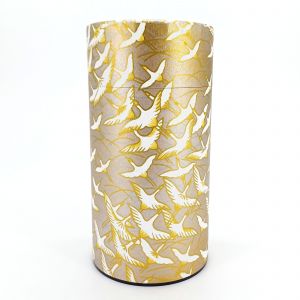
Beige Japanese tea box in washi paper - TSURU 1 - 200gr
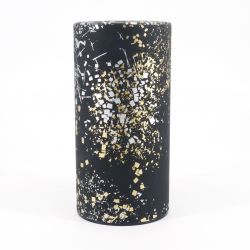
Black Japanese tea box in washi paper - HOSHI - 200gr
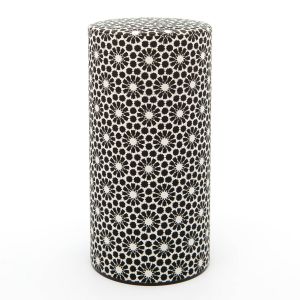
Black Japanese tea box in washi paper - KIKU - 200gr
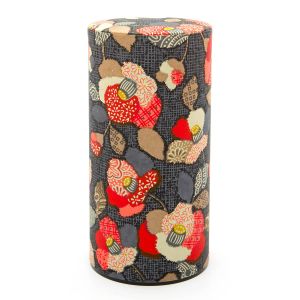
Black Japanese tea box in washi paper - TSUBAKI - 200gr
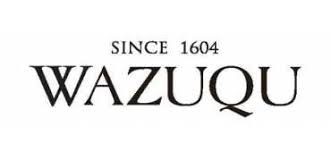
wazuqu
Wazuqu is a Japanese manufacturer of high-quality Japanese teapots, founded in 1604 in Yamagata, Tohoku region of Japan. Since its creation, the company has specialized in the production of ceramic teapots, using traditional artisanal techniques passed down from generation to generation. Wazuqu artisans are renowned for their expertise in creating premium ceramic teapots, which are valued for their aesthetics and functionality. Wazuqu teapots are made from high quality clay and are fired at high temperatures to create sturdy, durable pieces. Wazuqu teapot designs are inspired by nature and traditional Japanese motifs, and each piece is unique. The company's artisans use sophisticated decoration techniques such as freehand painting and lacquering to add elegant and vibrant details to the teapots. Today, Wazuqu is an internationally renowned teapot manufacturer, recognized for its quality, exceptional craftsmanship and commitment to preserving traditional ceramic teapot-making techniques. Wazuqu teapots are highly sought after by tea connoisseurs and collectors of Japanese art. Les artisans de Wazuqu sont renommés pour leur expertise dans la création de théières en céramique de qualité supérieure, qui sont appréciées pour leur esthétique et leur fonctionnalité. Les théières de Wazuqu sont fabriquées à partir d'argile de haute qualité et sont cuites à des températures élevées pour créer des pièces robustes et durables. Les designs de théières Wazuqu sont inspirés par la nature et les motifs traditionnels japonais, et chaque pièce est unique. Les artisans de l'entreprise utilisent des techniques de décoration sophistiquées telles que la peinture à main levée et le laquage pour ajouter des détails élégants et vibrants aux théières. Aujourd'hui, Wazuqu est un fabricant de théières de renommée internationale, reconnu pour sa qualité, son artisanat exceptionnel et son engagement envers la préservation des techniques traditionnelles de fabrication de théières en céramique. Les théières Wazuqu sont très recherchées par les connaisseurs de thé et les collectionneurs d'art japonais.




















